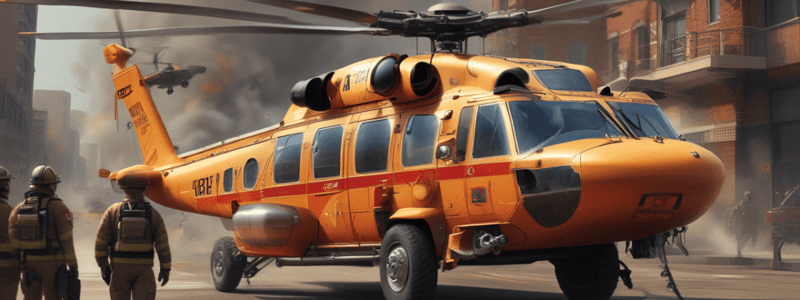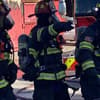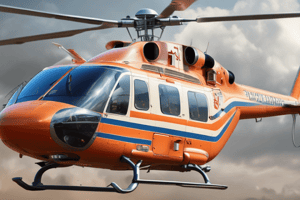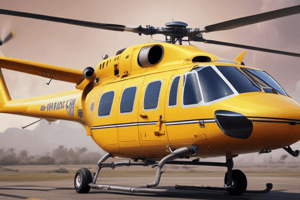Podcast
Questions and Answers
What is the proper side to approach and depart from if a helicopter has landed on a slope?
What is the proper side to approach and depart from if a helicopter has landed on a slope?
- Directly from the rear
- Either side
- Downslope side (correct)
- Uphill side
How far should all ground vehicles be kept from a helicopter while it is on the ground?
How far should all ground vehicles be kept from a helicopter while it is on the ground?
- 70 feet (correct)
- 100 feet
- 50 feet
- 200 feet
What distance should bystanders maintain from the helicopter while it is on the ground?
What distance should bystanders maintain from the helicopter while it is on the ground?
- 150 feet
- 50 feet
- 100 feet
- 200 feet (correct)
What safety measure must be taken regarding eye protection during helicopter landings and takeoffs?
What safety measure must be taken regarding eye protection during helicopter landings and takeoffs?
What should ground crew members do once the patient is loaded into the helicopter?
What should ground crew members do once the patient is loaded into the helicopter?
What figure signal indicates it is safe for a helicopter to land during the day?
What figure signal indicates it is safe for a helicopter to land during the day?
What must a helicopter landing zone (LZ) be free from to ensure safety during landing?
What must a helicopter landing zone (LZ) be free from to ensure safety during landing?
Who is responsible for the assignment of a landing zone coordinator at an incident?
Who is responsible for the assignment of a landing zone coordinator at an incident?
What is the minimum size requirement for a helicopter landing zone?
What is the minimum size requirement for a helicopter landing zone?
What is a crucial factor when determining the wind direction for helicopter landing?
What is a crucial factor when determining the wind direction for helicopter landing?
What is the maximum allowable slope for a helicopter landing zone?
What is the maximum allowable slope for a helicopter landing zone?
What should be done if any obstructions are present in the landing zone?
What should be done if any obstructions are present in the landing zone?
What is one reason helicopter transport may be necessary?
What is one reason helicopter transport may be necessary?
What is a key role of the landing zone coordinator?
What is a key role of the landing zone coordinator?
What is the correct arrangement of vehicles when marking a night landing zone?
What is the correct arrangement of vehicles when marking a night landing zone?
Which type of lighting is safest for the pilots when marking the landing zone at night?
Which type of lighting is safest for the pilots when marking the landing zone at night?
What should the LZ Coordinator do when guiding the helicopter to land?
What should the LZ Coordinator do when guiding the helicopter to land?
What action should NOT be taken after the helicopter lands?
What action should NOT be taken after the helicopter lands?
What is the best practice for providing security for the helicopter?
What is the best practice for providing security for the helicopter?
When should the LZ Coordinator position a company for firefighting?
When should the LZ Coordinator position a company for firefighting?
What is the safest way to approach and depart from a helicopter?
What is the safest way to approach and depart from a helicopter?
What should be done with any objects while around the helicopter?
What should be done with any objects while around the helicopter?
Flashcards are hidden until you start studying
Study Notes
Helicopter Landing Zones
- Requests for helicopters are made through the Fire Allocation Officer (FAO) by the Incident Commander (IC).
Helicopter Transport Criteria
- Hazardous or impassable road conditions exist, resulting in delays for patients requiring rapid transport.
- Multiple victims of a serious nature require rapid transport.
- Initial resuscitation measures have been successful, and rapid transport by ground ALS is not available.
- Other circumstances, such as prolonged extrication time, may occur, requiring individual judgment on the use of helicopter transport.
Landing Zone Guidelines
- The Incident Commander (IC) assigns a Landing Zone (LZ) coordinator.
- The LZ coordinator is responsible for:
- Selecting the area for the LZ.
- Establishing and maintaining radio communications with the helicopter.
- Ensuring adequate personnel are on the scene to control the LZ.
- Ensuring all precautions and procedures are observed.
Landing Zone Requirements
- The LZ should be:
- Level, firm, and free from loose debris.
- At least 70' x 70' in size.
- Have no more than a 2% slope.
- Free from obstructions at a 45-degree angle from grade level.
- Clear of people, vehicles, and obstructions such as trees, poles, and wires.
- Determined wind direction, with helicopters landing and taking off into the wind.
Marking a Night Landing Zone
- Arrange two vehicles facing into the wind with headlights crossing at the center of the LZ.
- Use reflective stripes on bunker gear to assist the pilot.
- Establish ground/air radio contact as soon as possible.
- Avoid pointing spotlights, flood lights, and hand lights directly at the helicopter.
- Avoid using white lights, which can create a hazard for the pilots.
- Use red lights, which are helpful in finding accident locations and do not affect night vision.
Ground Procedures
- When the helicopter is sighted, the LZ Coordinator guides it to a safe landing.
- Eye protection should be worn.
- The LZ Coordinator stands with their back to the wind and arms raised over their head (with flashlights in each hand for night operations).
- The LZ Coordinator positions a company to provide quick extinguishment in case of a fire near the LZ.
- Do not approach the helicopter after it has landed.
- Medical crew exits the aircraft toward the front.
- Ground crew members direct the medical crew to the patients requiring medical attention.
- Be prepared to assist the crew by providing security for the helicopter.
Additional Safety Considerations
- Approach and depart the helicopter from the downslope side only if it lands on a slope.
- Keep ground vehicles at least 70 feet away from the aircraft.
- Keep bystanders at least 200 feet away.
- Wear eye protection during landings and takeoff.
- Keep chin straps securely fastened.
Hand Signals
- Refer to Figures 300.10.1.4a-d for helicopter hand signals.
Studying That Suits You
Use AI to generate personalized quizzes and flashcards to suit your learning preferences.





